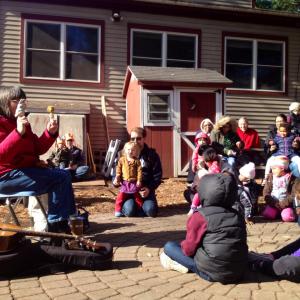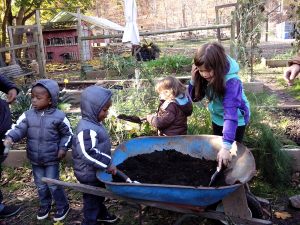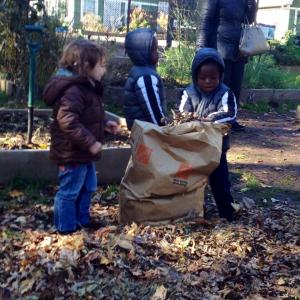All Our Kin’s Garden Project is a two-year enrichment program offered to Family Child Care Providers who want to enhance their outdoor curriculum through gardening. Providers learn about the important role that nature plays in a child’s physical, cognitive, and social/emotional development. As a result, children in these programs spend more time outdoors, eat more healthy food, and gain valuable outdoor learning experiences.
 On the warm and sunny morning of November 8th, a group of children, family members, and child care providers gathered around the stone circle on the campus of Common Ground. The only sound heard was the occasional cluck of a chicken as the children waited quietly, seated on the ground. Several pairs of eyes looked up at Ann Shapiro, the executive director of the Connecticut Storytelling Center, as she sat at in a plastic chair and greeted the crowd. “I hear this group has done some gardening this summer! I have a song for you about a boy who wanted to grow a carrot.” She hoisted her guitar up onto her lap and began to play and sing:
On the warm and sunny morning of November 8th, a group of children, family members, and child care providers gathered around the stone circle on the campus of Common Ground. The only sound heard was the occasional cluck of a chicken as the children waited quietly, seated on the ground. Several pairs of eyes looked up at Ann Shapiro, the executive director of the Connecticut Storytelling Center, as she sat at in a plastic chair and greeted the crowd. “I hear this group has done some gardening this summer! I have a song for you about a boy who wanted to grow a carrot.” She hoisted her guitar up onto her lap and began to play and sing:
“I’ll water it, I’ll pull the weeds,
Carrots come from carrot seeds”
This was the start of All Our Kin’s Garden Project final celebration. Family child care providers who were participants in this two-year project came together to celebrate with the families they serve. At least 63 children and family members came that day to participate in the storytelling, hold a chicken, help plant garlic in the Children’s Garden, or explore the working farm and high school located in West Rock State Park. By connecting with these families, we hoped to share more about what All Our Kin’s Garden Project means for their children and why it’s important. We also got a chance to thank them for their help in this important endeavor of getting kids outside.
After the families left around noon, the family child care providers gathered in a classroom in the high school building. This was their last workshop together as a cohort, and the mood was both celebratory and reflective. The participants have all come a long way since they sat in this place as program applicants in May of 2013.
The providers will be the first to tell you that having a garden is a lot of work. It’s not just a pretty place to hang out and snack on tomatoes. This is a luxury that is earned through lots of effort. Providers care tirelessly for their gardens on top of the existing demands of the child care program, including planting, weeding, watering, dealing with insects, and finally harvesting.
Another lesson they’ve learned: the garden is a classroom. For many, garden time didn’t end after the daily gardening chores were done. Several providers also changed their schedules to spend more time outdoors, stayed out to explore, and incorporated garden themes into their indoor curriculum.
They would also attest to the truth of this quote by Robert Brault, “Why try to explain miracles to children when you can have them plant a garden?” By now, these providers know a thing or two about gardening, and also about miracles. In the closing moments of our final meeting, the providers shared stories of their experiences:
Josie Queen and Yanerys Aziz, both providers, cited examples of how the garden has increased the amount of dramatic play in which the program’s children engage. In order to encourage the children in her program to eat carrots and other vegetables, Yanerys created a pretend game in which she was “Mama Bunny” and the children were “Baby Bunnies”; they re-enacted the game that afternoon around pick-up time, and parents were shocked to see their children eating vegetables right from the garden.
Maria Edith Perez, a New Haven provider, shared a story about a parent in her program coming back late in the afternoon after all the children had left. She asked Maria Edith if she could get basil from the garden to make pesto for her family. The provider noted with pride that the parents in her program see her garden as a community resource.
 Bernadette Ngoh, a West Haven provider, shared that the coming winter was going to be hard for her because she has trouble getting the kids in her program to come inside. By the end of the summer, she and the children in her program were spending most of the day outdoors, apart from naptime. Next year, her goal is to take naps outdoors, too.
Bernadette Ngoh, a West Haven provider, shared that the coming winter was going to be hard for her because she has trouble getting the kids in her program to come inside. By the end of the summer, she and the children in her program were spending most of the day outdoors, apart from naptime. Next year, her goal is to take naps outdoors, too.
We at All Our Kin (and our partner organization, Common Ground) are grateful to the thirteen providers who were a part of the pilot initiative that has become the Garden Project. I’d like to say a special thank you to them for their hard work, dedication, open minds, and, at times, patience as we grew and learned together. Because of them, we will continue to bring valuable outdoor learning experiences to some of the most vulnerable children in greater New Haven and Bridgeport. Although these provider “graduates” will no longer receive regular Garden Project visits from an All Our Kin Educational Consultant, the impact of the program is by no means over. With the newly-formed community of provider-gardeners they’ve created, they hope to stay in touch and use each other as a resource in future seasons. So far, everyone plans to start their gardens again next year and continue the changes they’ve made to their programs. After some well-deserved rest, they’ll soon start dreaming up next year’s garden with the children in their care to keep summer memories warm all winter long.
Stephanie Lorek is an advocate for urban gardens and the outdoor learning movement. As an Educational Consultant at All Our Kin, she works with child care providers in their gardens and outdoor spaces.

